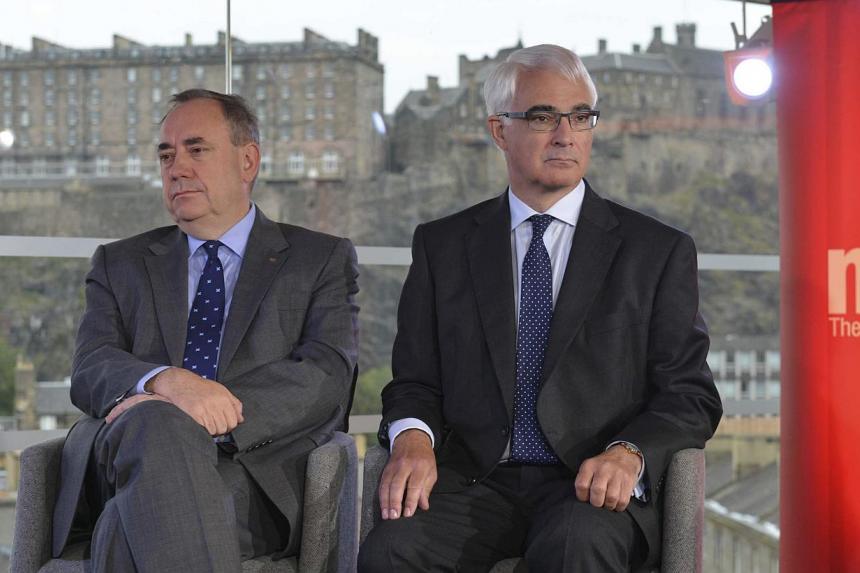He is a seasoned gambler on horses and, by all accounts, a successful one too. But later this week, Mr Alex Salmond, Scotland's regional leader, will be placing the biggest bet of his life, as his people vote in a referendum on whether they should sever their links with the rest of the United Kingdom and become an independent state.
The polls indicate a close result, although most bookies believe Mr Salmond will lose this particular gamble. Still, the man who fought against all the odds and who has already transformed British life will not give up that easily.
For he is by far the most accomplished of all British politicians, a reminder of just how significant the personality of one individual can still be in determining the fate of nations.
Alexander Elliott Anderson Salmond - as he is formally known - claims that his "pride in the Scottish nation" was imprinted on him by his parents in his modest home on a housing estate in Linlithgow, the heart of Scotland, where he was born in 1954.
Like many other claims by Mr Salmond, this one is not easy to corroborate: All we know is that his mother remained a lifelong supporter of the Conservatives, who abhor Scottish independence, while his father switched from Labour to the Scottish National Party (SNP) only late in life.
Still, the story of the young Salmond burning with patriotic fervour plays out well in Linlithgow, a town which takes all myths seriously: The place has even installed a plaque on the spot where the fictional Star Trek character Scotty was "born" in the year 2222.
The young Alex's life started conventionally enough: He earned a place to read economics at St Andrews, Scotland's oldest university, then got a job in the civil service.
Yet almost everything which followed was out of the ordinary. Soon after starting work, he married his office boss: He was in his mid-20s at the time; she was in her early 40s. The marriage remained childless but happy, although Mrs Moira Salmond, now in her late 70s, always keeps out of the limelight.
Mr Salmon also opted to ditch the security of his employment for the uncertainty of Scotland's treacherous politics. And he initially wanted the SNP to veer sharply to the left, just when most voters opted for Mrs Margaret Thatcher, the Conservative leader who decisively moved Britain's political centre of gravity to the right.
For a while, he proved such a nuisance that the SNP expelled him. Still, he bounced back, and got himself elected to the British Parliament in London in 1987. Three years later, he became the SNP's leader and not long thereafter became a national politician.
One of his strongest advantages is his image as a rotund, harmless uncle with a mischievous smile and the human touch. This is such an asset that when he left the SNP leadership in a huff a decade ago, the party begged him to return.
Mr Salmond is also a superb self-advertiser, a master of media-savvy gimmicks. He persuaded actor Sean Connery of James Bond fame to support Scotland's independence movement, conveniently glossing over the fact that Connery seldom visits his homeland, since he is a tax exile.
Mr Salmond also unfurled a Scottish flag behind British Prime Minister David Cameron in a prank worthy of a naughty schoolchild. And despite his avuncular image, he is notorious for his rude treatment of journalists and fondness for the company of billionaires such as tycoons Donald Trump and Rupert Murdoch.
But his biggest achievement was his refashioning of a Scottish nationalist party once dismissed as bigoted and racist into a positive movement which talks about progress and inclusive values. This has enabled him to present a "yes" in the independence referendum into another way of kicking out the London-based establishment.
And it has also provided Mr Salmond with the ultimate conjuring trick: The ability to claim that Scotland's independence is both an urgent and important project but that, at the same time, it will not change the life of the Scots or cost them anything, since they get to keep the Queen and the British pound, and nestle under Britain's military umbrella.
Other politicians may dismiss his proposals for breaking up the United Kingdom as deeply flawed or downright phoney. However, Mr Salmond knows the Scots prefer to vote with their hearts rather than their pockets. So, when he was recently cornered in electoral debates with awkward questions about his future economic policies, he just retorted: "Are you saying that Scots cannot be trusted to run their own affairs?"
As strange as it seems, he is guaranteed to win regardless of the result of Thursday's Scottish referendum. If his independence proposal is approved, he pledges that a new country will be born in not more than 18 months. But if it is rejected, he will bid his time, and hold another referendum when the opportunity presents itself or, more likely, when the English majority in the United Kingdom tires of his antics.
Like it or not, Britain's domestic politics will be shaped by him in years to come. And quite a few Scots are prepared to bet that Mr Salmond will ultimately fulfil his lifelong dream of becoming the father of an independent nation.

